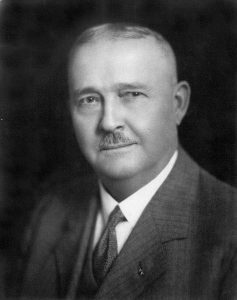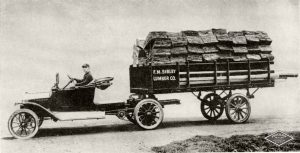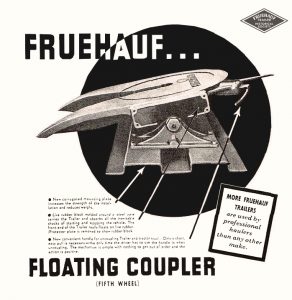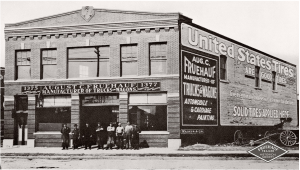2017 Automotive Hall of Fame Inductee August Fruehauf is credited with inventing the semi-trailer and successfully commercializing his invention into one of the most important transportation innovations of the 20th century. As founder of the Fruehauf Trailer Company, August Fruehauf set the wheels in motion for the entire trucking industry. We recently sat down with August’s granddaughter, Ruth Fruehauf, who will be accepting his induction into the Automotive Hall of Fame on June 20. Ruth is the co-founder of the Fruehauf Trailer Historical Society, a group that documents the history, contributions and legacy of the Fruehauf family. She spoke with us about August’s life, why his contributions were so significant and the legacy he left.
Who was August Fruehauf?
 August Fruehauf was the American-born son of German immigrants who settled in Fraser, Michigan. In 1882, at the age of 14, he went to seek his fortune in Detroit. In 1890, he began his career as a blacksmith. He established his first workshop in Detroit in 1899 and quickly built a reputation as one of the best blacksmiths and horse-carriage builders in the country.
August Fruehauf was the American-born son of German immigrants who settled in Fraser, Michigan. In 1882, at the age of 14, he went to seek his fortune in Detroit. In 1890, he began his career as a blacksmith. He established his first workshop in Detroit in 1899 and quickly built a reputation as one of the best blacksmiths and horse-carriage builders in the country.
What prompted August to create the semi-trailer?
In 1914, Frederic M. Sibley Sr., a Detroit lumber manufacturer, came to see August about a problem. Sibley owned a boat which he wanted to transport to his summer home in northern Michigan. A horse drawn wagon could accomplish this task, but would take days to do so. Sibley asked Fruehauf if he could construct a device which could tow the boat behind his Ford Model T. Fruehauf removed the front axle from a wagon that was attached to the rear of Mr. Sibley’s Model T. Rather than hitching the wagon to the Model T’s bumper, he removed its backseat and attached the trailer using a pin hitch on top of the chassis. They called their invention a “semi-trailer.” Once Henry Ford heard that this Model T had been modified, he withdrew its warranty.
What made this such a groundbreaking piece of transportation technology?

Fruehauf’s trailer successfully transported the boat to the lake. Mr. Sibley was impressed by its performance and decided that such a rig would be most efficient for running about his lumber yard. He asked August to build a stronger semi-trailer with a platform. The practical and economic advantages of Fruehauf’s trailer soon caught the attention of other lumber dealers in Detroit and orders began pouring into August’s shop.
Why were August’s trailers so well regarded?
As a child, August was exposed to the artisans at the Moffat & Eatherly sawmill where his father worked. Because there were many immigrants seeking few jobs, these craftsmen needed to perform at their very best. This is where August developed his excellent customer service skills. A dedicated work ethic resulting in quality products and workmanship were hallmarks of the Fruehauf Trailer Company.
What additional contributions did Mr. Fruehauf make to the modern trucking industry? Are any of these innovations still in use today?
 Nearly all of them are still in use. One of his major contributions was the automatic 5th Wheel in 1926. This design for connecting the tractor to the semi-trailer is still in use around the world. Fruehauf also constructed the first refrigerated semi-trailer in the world and even designed 125 different types of trailers for the U.S. Army during WWII.
Nearly all of them are still in use. One of his major contributions was the automatic 5th Wheel in 1926. This design for connecting the tractor to the semi-trailer is still in use around the world. Fruehauf also constructed the first refrigerated semi-trailer in the world and even designed 125 different types of trailers for the U.S. Army during WWII.
How important was the Fruehauf Trailer company within the trailer industry?
By 1960, Fruehauf Trailer Co. had become the world’s largest builder of semi-trailers. They built 40% of the freight trailers in the U.S. and employed 14,000 people in 14 plants. In total, the company had 80 sales and service branches in the U.S. and Canada. When Fruehauf was acquired in bankruptcy by Wabash National in 1997, it was ranked the 75th largest company in the world.
Given his accomplishments, how would you describe Mr. Fruehauf’s legacy?

Fruehauf’s motto was “Built to Last.”. His trailers hauled the world’s goods. They were first in the new transportation industry and became the biggest and best. Everything that is used by consumers or in industry is at some point transported by trailer. Fruehauf trailers directly contributed to the nation’s economic expansion. With efficient transport from the farmer’s fields and the countries loading docks, Fruehauf trailers were indirectly involved with every phase of the country’s social and economic structure, as well as national defense.